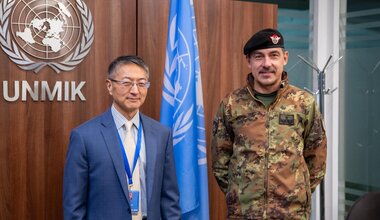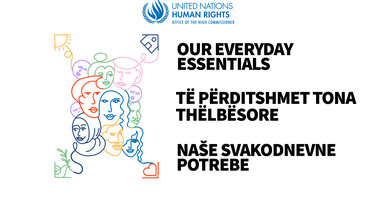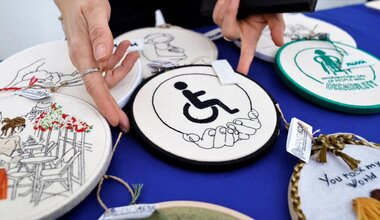16 May
2016
Statement by Zahir Tanin, Special Representative of the Secretary-General and Head of UNMIK
Statement by Zahir Tanin, Special Representative of the Secretary-General and Head of UNMIK
New York
16 May 2016
Mr.President, Excellencies,
The Secretary-General’s report before you details essential events in Kosovo and the region, and activities of UNMIK, from mid-January to mid-April. However, some developments since the Secretary-General’s last report are of more importance than the routine activities. Accordingly, today I wish to highlight these,and some broader considerations. I have spent a good part of my professional life on your side of this table, and thus I am aware that routine reporting is not always the best use of time devoted to matters on which the Council remains actively seized.
First of all, Kosovo has been, and continues to be,at the center of issues vital for overall security in Europe and for relations in a wider context. As I emphasised in my last statement to you in February, internal political dynamics in Pristina preoccupied our mission — as well as the EU missions and many other actors –for almost one year, culminating this April in the inauguration of a new President of Kosovo.Also during April, Serbian general elections were successfully held, with a new Parliamentand Cabinet there currently in the process of formation.
The election of a new President of Kosovo, albeit under a divisive atmosphere, and the newly mandated government of the Republic of Serbia provide, together I believe, an excellent opportunity to draw a line under a period which has often been marked bypolitical infighting andother distractions. I noted with appreciation the conciliatory messages and vision presented both by Prime Minister Vučić and by President Thaçi following their respective electoral successes. I join other engaged actors in the hopethat these peaceful transitions of power willhelp the political scene to settle,and will offer more roomfor energy to be spent on other,more fundamental,challenges facing the region.
Less than two weeks ago, the population of Kosovo received important and undoubtedly welcome news: the European Commission formally proposed, to the EU Council andEU Parliament,to transfer Kosovo to the visa-free short-stay list for travel in the “Schengen area”. The authorities in Kosovo deserve credit for the efforts made toward fulfilling the conditions of the “visa liberalisation roadmap”. At the same time,they have acknowledged that a great deal of work remains, in order to translate this important step into the concrete economic and social progressexpected by Kosovo’s people.
I noted that one month earlier,the EU Stabilisation and Association Agreement for Kosovo wasalso announced. The Republic of Serbia’sStabilisation and Association Agreement entered into force back in September 2013. Again, placed side by side, these crucialachievementsdemonstrate the progress the region is making toward the goal of greater integration, with all the benefits such integration brings. The links are not always clearly spelled out between the ongoing peace process, which is at the core of our UNMIK mandate, and these EU processes. In fact, the linksare fundamental, stressed not simply in Resolution 1244 of 1999, but also in the far-sighted European Council Summit held in Thessaloniki in 2003 and ever since. The standards and conditions set forth in EU Stabilisation and Association agreements are not the ends, but more importantly the means for generating peace, prosperity and well-being for people.
For Pristina and for Belgrade, integration is closely interlinkedwith the EU-facilitatedhigh-level Dialogue process. The capacity to meet the standards of integration directly reinforces the capacity for productive political dialogue and for other important channels of mutual cooperation. Kosovo’s recent advancement in its European perspectiveshould reinforce and enhance the dialogueprocess between Belgrade and Pristina, which is fundamentalto Kosovo’s future security, and to peace in the region.
Mr. President,
A salient feature of the consensus on which the EU-facilitated dialogue rests, is the requirement for flexibility and innovation. All possibilities should be on the table, and should be debated openly, for this framework of discussion to make swifter and meaningful progress. At this moment, with electoral processes nearly concluded on both sides, it appears to be a propitious time to re-energise the talks and build new momentum. I believe this must remain a central objective on both the EU and UN agendasduring the coming months.
The establishment of the Association/Community of Serb majority municipalities in Kosovo, ever since it was first agreed in April 2013, has been subject to much misunderstanding and controversy in public discourse among both communities. To borrow words from EU High Representative Federica Mogherini ten days ago in Pristina, the Community/Association represents “a step towards a stronger Kosovo, not a weaker one, and in a more stable region”.It was agreed by both sides, at the highest level, in order to allow for the livable integration of the Serb community, and of other communities, into public life in Kosovo. During his inaugural address, President Thaçi stressed themes of reconciliation, and spoke of the difficulty but also the necessity of leaving the past behind. The dialogue and the agreements between Pristina and Belgrade are essential to this process and are real steps on the path to lasting peace.
Mr. President,
Kosovo still faces the hard-nosed realities caused by unemployment, inequality, the challenges of developing a productive economyto meet sustainable development goals, overcome legacies of impunity, and weaknessesinits rule of law institutions.All these factors are serious challenges to the mandate of promoting peace and stability. International involvement should be a central component of support which can help Kosovo’s institutions, and indeed the wider region, to meet such difficult challenges. Resources which are applied through international channels, including through our mission, should be mutually reinforcing, and they should be directed efficiently toward meeting these common goals.
I have spoken to leaders representing all parties, political stripes, and communities during the past weeks and months. I will do much more of this in the coming days. The main concerns I hear are those which are familiar everywhere in post-conflict settings:the need for economic opportunity,positive future perspective for communities and families, better health care, and a clean environment. While visiting municipalities in the North, and in other parts of Kosovo, I have seen just how essential it is that the engagement of the international community –including the UN, the EU, and the Member States –is focused upon the real conditions in which people are living their lives. RealKosovo politics are local. What matters is how leaders, like those to whom I have spoken in various different municipalities, address the everyday needs of the people intheir communities. How they understand their grievances; how they find solutions. If identity politics primarily drove the wars during the collapse of former Yugoslavia, what we witness nowisthe unity or polarisation of people around issues which are foremost social, economic, and environmental. I observed, visiting different parts of Kosovo, how muchof what we sometimes call the “old world” is dispensable. Militant nationalism has “lost the mandate of heavens”. What is sorely awaited is a new alternative. When I speak with Kosovo’s youth about their concerns, jobs and justice are the two words I hear the most often.
Within Kosovo’s political sphere, continuing differences and intense debate remain essential. I hope these debates will move into acceptable channels, where they belong, and where leaders can best work toward meeting the real interests of people. This includes, obviously,a strong, democratic opposition. The political profile of the Kosovo opposition has, for the past year, involved itself in a restless determination to change the horizon of power in the Assembly by“any means necessary”, including violence. I believe its reconsideration of this path, though wrongly portrayed by some as a“descent of dissent”,is rather an opportunity to revitalisethe atmosphere that is still suffering from deep mistrust;a return to healthy democratic normsbut without sacrificing the substance of political dissent and debate. Whatever political reconfigurations may or may not be in the cards, what is more important is that Kosovo’s political actors act responsibly in taking on the issues that matter most for the future.
Mr. President,
Our mission remains unique, not only for what it is, but also for what it is not. UNMIK no longer administers Kosovo.It is not a parallel structure. It is not anobstacle to any objective, any institution, or any individual. UNMIK remains important for the support and legitimacy it can provide; for the focus it can help to encourage; for the experience and know-how it freely shares; and for its role as a bridge between this Noble Council and the people and communities of Kosovo and the region. We have been assessing and recalibrating our own use of resources to assist areas where they most directly promote the fulfillment of our mandate, on Human Rights issues for example. Indeed, as the leading UN body on the ground we are working closely with Kosovo Institutions as well as with international partners to promote the realisation of high human rights standards.Being part of the broadest and most inclusive efforts tohelp discourage corruption and provide supportin the Rule of Law area, realise better opportunities for families and for the younger generation, and strengthentheprotection of non-majority and vulnerable communities. We are also drawing on areas where expertise and resources from across the UN system can assist: with the UN Office on Drugs and Crime, for example, and many bodies which are specialised in pressing issues; the just handling of migrant and refugee flows; and working to discourage young people from the paths that lead to violent extremism and terrorism.
To work at its best, our mission depends upon the informed support of this Council, in order to work together with the leadership in both Pristina and Belgrade, as well as with the institutions of the European Union, to remain flexible and to adapt. With your support, this is where we intend to take thismission in the days ahead.
Thank you very much.
Security Council
 UN
UN United Nations Peacekeeping
United Nations Peacekeeping





